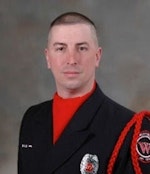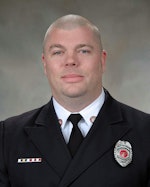Morale is a Firefighter’s Personal Responsibility
Why do you want to be a firefighter? This is such a simple and common question and one that many of us were asked at our interview. The answer can change over time, whether we realize it or not.
Take a second to think about your original answer to the question and then how you would answer it differently now. Originally, maybe you wanted to help people, to be a part of a brother/sisterhood or to serve your community. Would your answer now change to “To make it to retirement” or something else?
No doubt, many things have affected or will affect your answer. One of the things can be morale. The morale of coworkers, company officers and chiefs can and do weigh heavily on attitudes toward the job.
‘Poor morale’
Fire service leaders have an inherent obligation to foster a culture of high morale. Often attributed to Albert Einstein, the statement “There is no such thing as darkness; darkness is only the absence of light” can be adapted to morale in the fire service:
- There is no such thing as poor morale, only the absence of leadership.
- There is no such thing as poor morale, only the absence of trust.
- There is no such thing as poor morale, only the absence of respect.
Every department and firefighter could create their own ending: There is no such thing as poor morale, just the absence of (fill in the blank).
If you take some time to meditate on this, with some serious reflection, the cause of poor morale within your organization easily might be pinpointed. That can be the first step toward addressing underlying issues and creating a more positive and productive work environment.
Pride, trust, value
The relationship between firefighter productivity and morale isn’t new. It’s been around for years.
High morale is vital to a firefighter’s performance and survival, so leaders must keep morale high. How do leaders do that? It might be easier than you think.
The way that leaders conduct themselves at all levels affects firefighters tremendously. Leaders having pride in what they do doesn’t take much work.
Firefighters must trust that their officers care about their well-being. The trust that firefighters have in their leaders—and, of course, in each other—enables them to run into burning buildings.
Firefighters must believe that, no matter what, their officers will do whatever it takes to ensure that they will go home mentally and physically healthy at the end of their shift.
Furthermore, mutual trust allows all members to work through everyday stress and to focus on the mission statement of the department.
Firefighters must feel valued and supported by their leaders, and trust is critical to this relationship.
Battalion chiefs and company officers are responsible for the accountability of their crews while on an emergency scene. They also are accountable for the atmosphere and culture of their shifts. Fixing the “fill in the blank” reason(s) from above is the responsibility of all department leaders, not just the fire chief. Battalion chiefs and company officers who show up to work prepared and with a good attitude can influence their shift and station positively. Leaders should never forget the feeling of awe and belonging the first time that they walked in the door, put on their gear and had their first effect on the life of a stranger.
Lead by example
A department’s fire chief can have a direct tie to the “fill in the blank” reason(s).
Fire chiefs must be present and approachable at the station. It is a failure of leadership and an embarrassment for chiefs to sit in their office behind a closed door all of the time or to believe that they can fulfill all of their duties as chief from home. A chief must walk around to get the pulse of the organization that they are in charge of leading.
Chief officers shouldn’t be afraid to get their white shirt dirty. They should never ask their crews to do something that they themselves aren’t willing to do.
“Lead by example” can’t be overstated. Demonstrate commitment to the safety and well-being of the crew. When on scene of a fire, help to load hose, to clean equipment. Tell the firefighters that they did a good job. Such actions make it more difficult for a firefighter to say, “The chief doesn’t get it” or “The chief doesn’t care.”
Far too often, firefighters aren’t seen as assets to an organization. Instead, they are treated solely as consumers of the budget. Being a leader who genuinely cares about the well-being of the crew is a great start to address the “fill in the blank” reason(s).
Two things that can help department leaders keep up their motivation:
- No matter what, come to work with a good attitude and work ethic.
- Remember your “why.” Why did you want to be a firefighter?
Nic’s “why”
People’s “why” can change throughout their career. Just like many others, my initial “why” was to serve my community and to help people. Although that still is a driving factor and an honor, my “why” shifted. I noticed that the firefighters and medics who I worked with yearned for leaders who actively engage with their careers and lives.
Innumerable articles have been written on fire department leadership. However, few come close to instilling the leadership traits and styles that the military teaches. I had the opportunity to serve as an Army firefighter for 22 years and learned from some of the best (and worst) leaders during that time.
A line from the Army’s Creed of the Non-Commissioned Officer reads, “All soldiers are entitled to outstanding leadership; I will provide that leadership.” Although very basic, this is such a true statement. From the salty firefighter who has many years on the job to the newest recruit, members want a leader who cares about them, their career progression, their family, their safety. They want someone who they can trust, including to perform their duties to the best of their abilities on every call, training and tasking.
Many people don’t like to hear about military leadership, because it conjures up images of a drill sergeant screaming at a recruit, but it’s so much more than that. The Army defines leadership as the “process of influencing people by providing purpose, direction and motivation to accomplish the mission and improve the organization.”
My “why” has shifted from solely providing a service to the public to serving the men and women who are assigned to my station. Leading firefighters in daily operations and responses to emergencies is a fantastic responsibility. Helping firefighters hone their skills and instilling the resilience to make it through a successful career are privileges.
Josh’s “why”
Nic’s and my dad was a firefighter. I grew up around the firehouse, going on runs with my him. Of course, times were different back then. I remember being a little kid, and Dad took me to breakfast. We were leaving breakfast, and a house fire was called in. My dad quickly drove to the firehouse, and he and I got in the fire truck with some other guys and went to the scene. When we arrived, Dad made me promise not to get out of the truck. I watched him and others pull the hose and fight back the fire. From that day forward, I knew that I would be a firefighter.
As my career has grown, so has my “why.” In the fire service, you often hear the phrase, “We are our brother’s and sister’s keepers.” For the past 13 years, I have served as a family escort for the National Fallen Firefighters Memorial Weekend. Every year, I escort a family whose loved one gave the ultimate sacrifice in the line of duty. Each National Fallen Firefighters Memorial Weekend reminds me of how precious life is, of how I must show up to work prepared, well trained and with the right attitude, to honor the loved ones of the families I have escorted.
My brother and I are telling you our “whys” because we want you to remember when you knew that being a firefighter would be your calling, your passion. Being a firefighter can wear you down even on the best days. It can damage your body, heart and mind. It can take a toll on your personal life. If you find yourself in a tough spot, feeling beat down from the stress and frustrations, we want you to remember why you became a firefighter in the first place and let your “why” drive you forward. By staying focused on it, you can weather the job’s stresses and challenges.
Take care of yourself and others.
Authors’ note: This article was written in honor of our dad, Gary Southerland: LODD Jan. 12, 2020.

Nicholas Southerland
Nicholas (Nic) Southerland is a 22-year member of the fire service. He is a lieutenant with the Westfield, IN, Fire Department. Southerland served as a firefighter in the U.S. Army and Indiana Army National Guard, where he held positions from station chief to fire inspector and eventually retired as fire chief. As an Army firefighter, he served in Operation Iraqi Freedom, Operation Enduring Freedom and Operation Freedom’s Sentinel. Southerland earned a Bachelor of Applied Science in fire service administration from Waldorf University and graduated from Primary, Advanced and Senior Army Leadership schools.

Josh Southerland
Josh Southerland has been with the Westfield, IN, Fire Department for 17 years. He is a lead Indiana advocate for the National Fallen Firefighters Foundation (NFFF), a volunteer member of NFFF’s Local Assistance State Team (LAST) for the past 14 years, a family escort for the NFFF Memorial Weekend for the past 13 years and a camp counselor/Big Buddy at the Comfort Zone Camp, which is an NFFF-partnered grief camp for children who lost a firefighter parent in the line of duty. Southerland holds a bachelor’s degree in fire service administration from Columbia Southern University.







